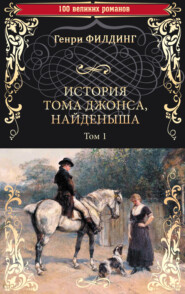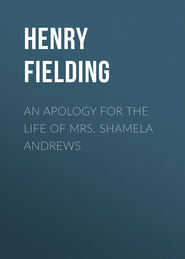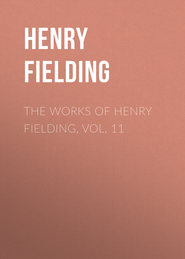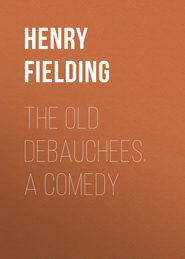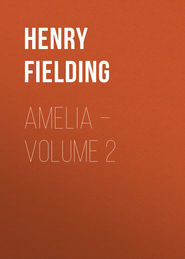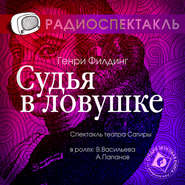По всем вопросам обращайтесь на: info@litportal.ru
(©) 2003-2024.
✖
The Works of Henry Fielding, vol. 12
Автор
Год написания книги
2017
Настройки чтения
Размер шрифта
Высота строк
Поля
Wit. Oh! Luckless, I am overjoyed to meet you; here, take this paper, and you will be discouraged from writing, I warrant you.
Luck. What is it? – Oh! one of my play-bills.
Wit. One of thy play-bills!
Luck. Even so – I have taken the advice you gave me this morning.
Wit. Explain.
Luck. Why, I had some time since given this performance of mine to be rehearsed, and the actors were all perfect in their parts; but we happened to differ about some particulars, and I had a design to have given it over; 'till having my play refused by Marplay, I sent for the managers of the other house in a passion, joined issue with them, and this very evening it is to be acted.
Wit. Well, I wish you success.
Luck. Where are you going?
Wit. Anywhere but to hear you damned, which I must, was I to go to your puppet-show.
Luck. Indulge me in this trial; and I assure thee, if it be successless, it shall be the last.
Wit. On that condition I will; but should the torrent run against you, I shall be a fashionable friend and hiss with the rest.
Luck. No, a man who could do so unfashionable and so generous a thing as Mr Witmore did this morning —
Wit. Then I hope you will return it, by never mentioning it to me more. I will now to the pit.
Luck. And I behind the scenes.
SCENE IX. – LUCKLESS, HARRIOT
Luck. Dear Harriot!
Har. I was going to the playhouse to look after you – I am frightened out of my wits – I have left my mother at home with the strangest sort of man, who is inquiring after you: he has raised a mob before the door by the oddity of his appearance; his dress is like nothing I ever saw, and he talks of kings, and Bantam, and the strangest stuff.
Luck. What the devil can he be?
Har. One of your old acquaintance, I suppose, in disguise – one of his majesty's officers with his commission in his pocket, I warrant him.
Luck. Well, but have you your part perfect?
Har. I had, unless this fellow hath frightened it out of my head again; but I am afraid I shall play it wretchedly.
Luck. Why so?
Har. I shall never have assurance enough to go through with it, especially if they should hiss me.
Luck. Oh! your mask will keep you in countenance, and as for hissing, you need not fear it. The audience are generally so favourable to young beginners: but hist, here is your mother and she has seen us. Adieu, my dear, make what haste you can to the playhouse.
[Exit.
SCENE X. – HARRIOT, MONEYWOOD
Har. I wish I could avoid her, for I suppose we shall have an alarum.
Money. So, so, very fine: always together, always caterwauling. How like a hangdog he stole off; and it's well for him he did, for I should have rung such a peal in his ears. – There's a friend of his at my house would be very glad of his company, and I wish it was in my power to bring them together.
Har. You would not surely be so barbarous.
Money. Barbarous! ugh! You whining, puling fool! Hussey, you have not a drop of my blood in you. What, you are in love, I suppose?
Har. If I was, madam, it would be no crime,
Money. Yes, madam, but it would, and a folly too. No woman of sense was ever in love with anything but a man's pocket. What, I suppose he has filled your head with a pack of romantick stuff of streams and dreams, and charms and arms. I know this is the stuff they all run on with, and so run into our debts, and run away with our daughters. Come, confess; are not you two to live in a wilderness together on love? Ah! thou fool! thou wilt find he will pay thee in love just as he has paid me in money. If thou wert resolved to go a-begging, why did you not follow the camp? There, indeed, you might have carried a knapsack; but here you will have no knapsack to carry. There, indeed, you might have had a chance of burying half a score husbands in a campaign; whereas a poet is a long-lived animal; you have but one chance of burying him, and that is, starving him.
Har. Well, madam, and I would sooner starve with the man I love than ride in a coach and six with him I hate: and, as for his passion, you will not make me suspect that, for he hath given me such proofs on't.
Money. Proofs! I shall die. Has he given you proofs of love?
Har. All that any modest woman can require.
Money. If he has given you all a modest woman can require, I am afraid he has given you more than a modest woman should take: because he has been so good a lodger, I suppose I shall have some more of the family to keep. It is probable I shall live to see half a dozen grandsons of mine in Grub-street.
SCENE XI. – MONEYWOOD, HARRIOT, JACK
Jack. Oh, madam! the man whom you took for a bailiff is certainly some great man; he has a vast many jewels and other fine things about him; he offered me twenty guineas to shew him my master, and has given away so much money among the chairmen, that some folks believe he intends to stand member of parliament for Westminster.
Money. Nay, then, I am sure he is worth inquiring into. So, d'ye hear, sirrah, make as much haste as you can before me, and desire him to part with no more money till I come.
Har. So, now my mother is in pursuit of money, I may securely go in pursuit of my lover: and I am mistaken, good mamma, if e'en you would not think that the better pursuit of the two.
In generous love transporting raptures lie,
Which age, with all its treasures, cannot buy.
THE TRAGEDY OF TRAGEDIES; OR, THE LIFE AND DEATH OF TOM THUMB THE GREAT
WITH THE ANNOTATIONS OF H. SCRIBLERUS SECUNDUS
FIRST ACTED IN 1730, AND ALTERED IN 1731.
H. SCRIBLERUS SECUNDUS,
HIS PREFACE
THE town hath seldom been more divided in its opinion than concerning the merit of the following scenes. While some publickly affirmed that no author could produce so fine a piece but Mr P – , others have with as much vehemence insisted that no one could write anything so bad but Mr F – .
Nor can we wonder at this dissension about its merit, when the learned would have not unanimously decided even the very nature of this tragedy. For though most of the universities in Europe have honoured it with the name of "Egregium et maximi pretii opus, tragoediis tam antiquis quam novis longe anteponendum;" nay, Dr B – hath pronounced, "Citius Maevii Aeneadem quam Scribleri istrus tragoediam hanc crediderium, cujus autorem Senecam ipsum tradidisse haud dubitarim: " and the great professor Burman hath styled Tom Thumb "Heroum omnium tragicorum facile principem: " nay, though it hath, among other languages, been translated into Dutch, and celebrated with great applause at Amsterdam (where burlesque never came) by the title of Mynheer Vander Thumb, the burgomasters receiving it with that reverent and silent attention which becometh an audience at a deep tragedy. Notwithstanding all this, there have not been wanting some who have represented these scenes in a ludicrous light; and Mr D – hath been heard to say, with some concern, that he wondered a tragical and Christian nation would permit a representation on its theatre so visibly designed to ridicule and extirpate everything that is great and solemn among us.
This learned critick and his followers were led into so great an error by that surreptitious and piratical copy which stole last year into the world; with what injustice and prejudice to our author will be acknowledged, I hope, by every one who shall happily peruse this genuine and original copy. Nor can I help remarking, to the great praise of our author, that, however imperfect the former was, even that faint resemblance of the true Tom Thumb contained sufficient beauties to give it a run of upwards of forty nights to the politest audiences. But, notwithstanding that applause which it received from all the best judges, it was as severely censured by some few bad ones, and, I believe rather maliciously than ignorantly, reported to have been intended a burlesque on the loftiest parts of tragedy, and designed to banish what we generally call fine things from the stage.







